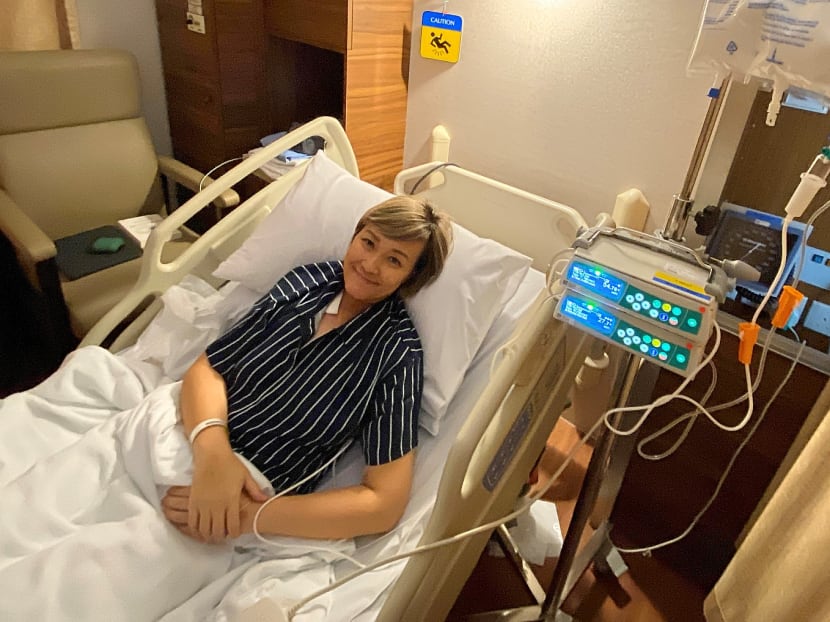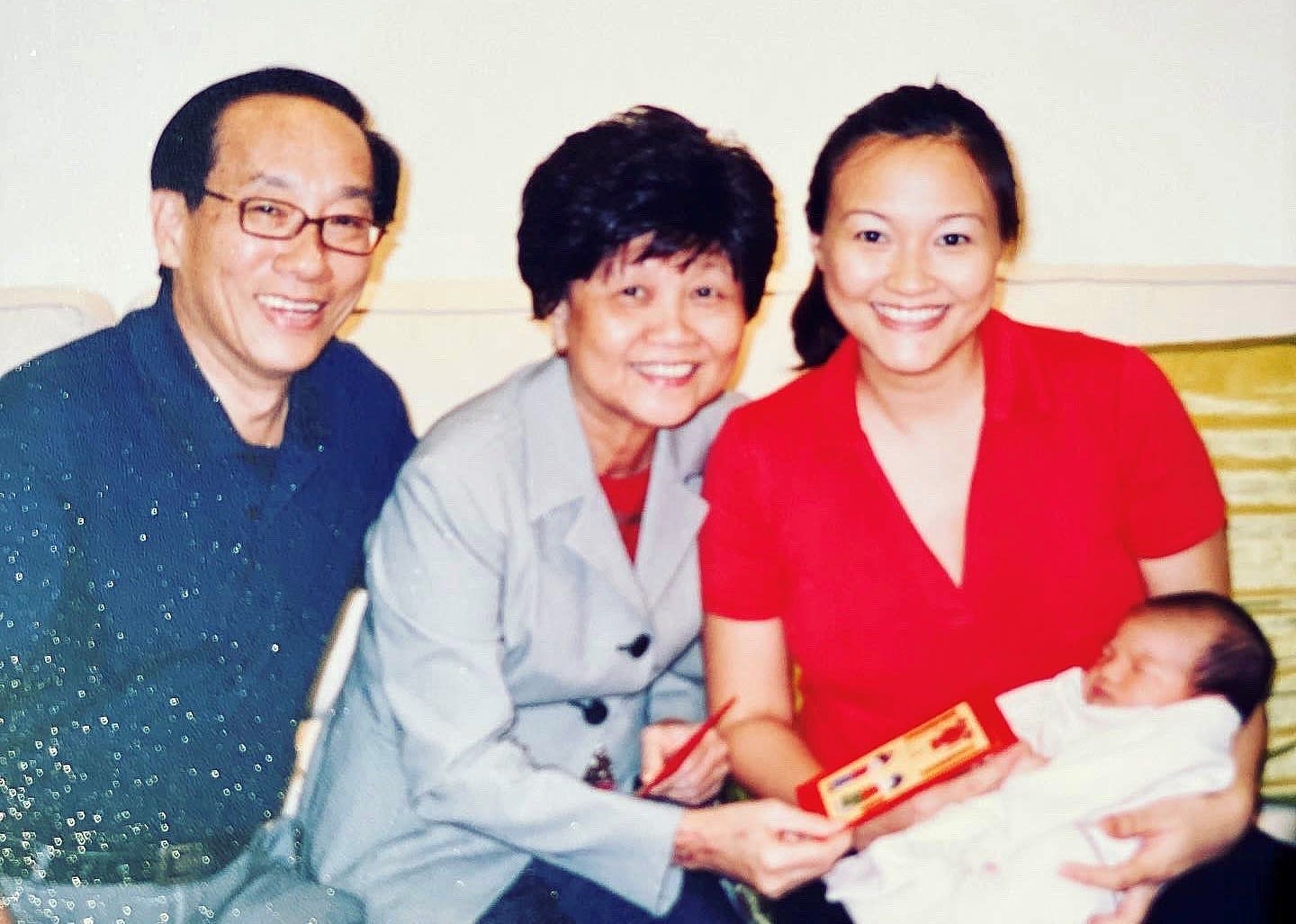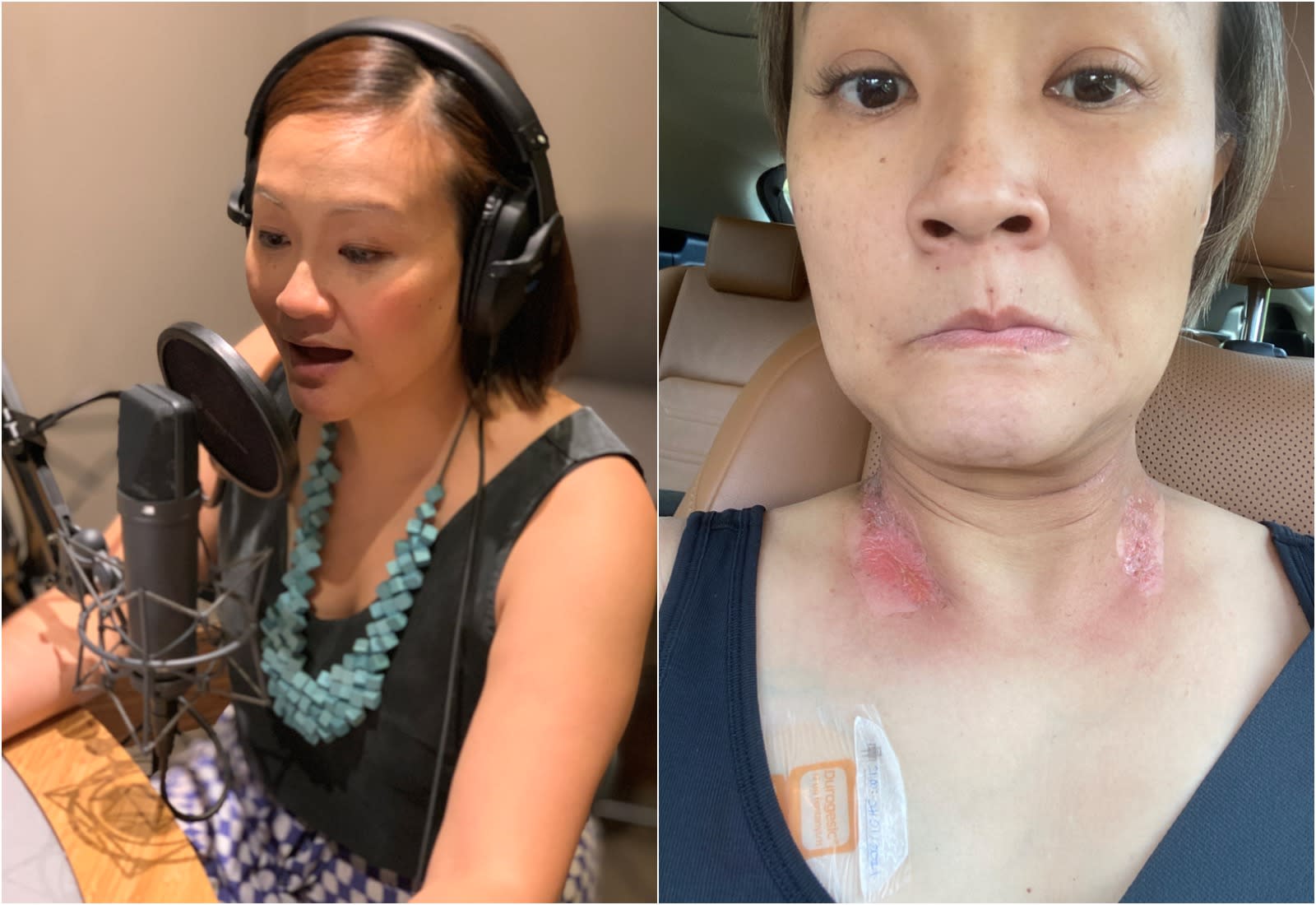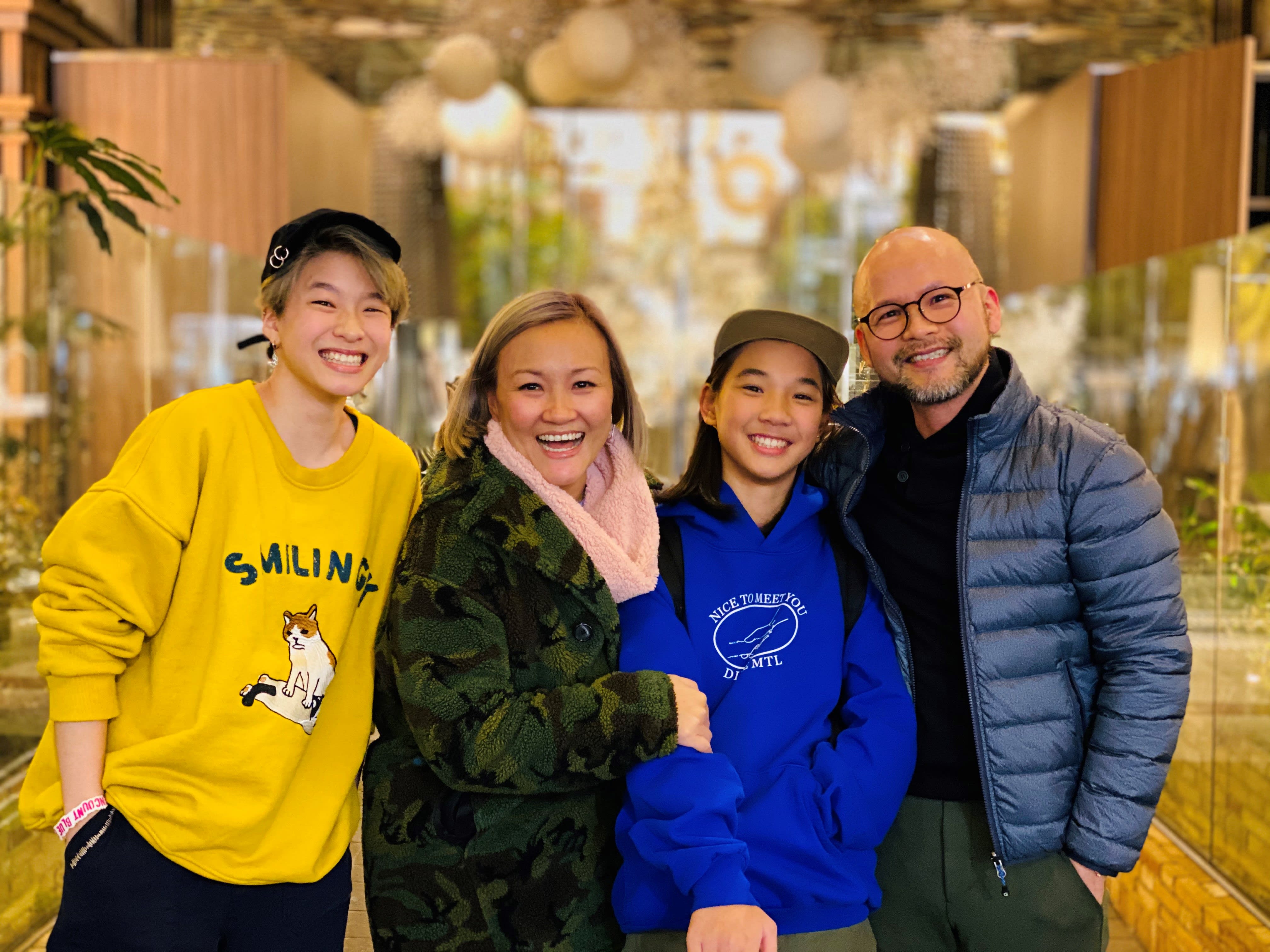What can you do when a loved one has cancer? Start by asking some questions and listening
SINGAPORE — Having open and honest conversations with a loved one who is facing a life-threatening disease such as cancer is not easy.

Former radio broadcaster Petrina Kow when she was hospitalised for cancer treatment. She was diagnosed with nasal cancer in 2020.
- It is important to have open and honest conversations with a loved one who has cancer, a medical social worker said
- This helps patients and their loved ones or caregivers make informed decisions during the cancer journey
- Professional voice coach Petrina Kow was a caregiver to her mother, who was diagnosed with lung cancer
- The 46-year-old talks about her difficulties in communicating openly with her mother when the elder was ill
- Ms Kow recently recovered from cancer herself after a 2020 diagnosis
SINGAPORE — Having open and honest conversations with a loved one who is facing a life-threatening disease such as cancer is not easy.
Knowing what to say or how to help may not come naturally for many family members or caregivers.
Despite being in a job that requires her to be expressive and articulate, professional voice coach and former radio deejay Petrina Kow, who was 26 then, recalled how hard it was to express her thoughts and feelings of uncertainty and helplessness during her mother’s battle with cancer.
Ms Kow’s mother was diagnosed with lung cancer in 2002. The mother suffered a stroke after undergoing surgery to remove half of her affected lung and died in 2005 after a cancer relapse.
In 2020, Ms Kow, who was 44 then, was diagnosed with nasal cancer. She has since completed treatment and recovered.
Having been on both sides of the cancer ordeal, as a caregiver and patient, Ms Kow now wants to raise awareness on the importance of having open conversations and discussions about cancer when a loved one falls seriously ill.
Now 46, she has two children aged 15 and 19, and has been a voice-actor for more than 20 years.
She spoke to TODAY as part of the “I Can. We Will” campaign, which aims to equip lung cancer patients and their caregivers with resources on how to communicate with loved ones and healthcare teams and make informed decisions on lung cancer care.
The campaign is supported by biopharmaceutical company MSD in partnership with the Singapore Cancer Society.
In Ms Kow’s experience of looking after a cancer patient, the toughest part was not knowing how her mother felt or what she really wanted.
Before her illness, the late Mrs Kow was a lively and gregarious teacher. She had speech difficulties after the post-surgery stroke.
“She became very quiet, passive and weak, which was a huge change. She was not able to express her emotional state and that was the hardest for me. I didn’t know how she felt, and it felt like we were just ‘dancing’ around her,” Ms Kow recalled.

Till today, Ms Kow wonders if she could have done more to check in on her mother’s emotions while fulfilling the day-to-day practical tasks of caregiving.
“We are not a particularly vocal family where everyone is open about our feelings,” she said.
“At the time, everyone in the family was in problem-solving mode, doing what was necessary to alleviate her pain and figuring out the next steps, such as should we take her to the hospital?
“In the early years after my mum passed on, it felt as if we were spared the awkwardness or agony of talking about difficult things (such as end-of-life discussions).
“But with hindsight now, there’s regret as I wonder if I did my full duty as a daughter to help her in the best way. I didn’t know how she felt, whether she was suffering or was in a lot of pain,” Ms Kow added.
WHY SOME PATIENTS AVOID THE CANCER TALK
Ms Jacinta Phoon Mui Leng, principal medical social worker with the department of psychosocial oncology at National Cancer Centre Singapore, said that the natural first reaction to any distressing situation is often a “flight” response.
In the case of a cancer diagnosis, patients may initially suppress their thoughts and feelings to avoid squaring up to the distress.
Sorting out their thoughts and feelings can take time, with each patient needing a different amount of time and space to do so.
While those who choose to accept the diagnosis may go on to “fight” the disease and proceed with treatment, some others may find it a challenge to talk about their emotions or fears.
“Some may continue to ‘flee’ when the cost of facing the diagnosis is overwhelming — such as death, pain and suffering, being a financial burden and losing functionality,” Ms Phoon said.
The patient may also feel guilty about burdening their loved ones and affecting their well-being. This is especially for those who are the main breadwinner in the family, or view themselves as responsible for their children’s welfare but have to depend on their children to care for them after a cancer diagnosis.
In all loving relationships, there is always a fear of burdening others, she added.
“Some patients might think, ‘I am going to be a physical and financial burden to them, so I shouldn’t burden them further with my emotions’.
"On the other hand, their loved ones might think, ‘I know that she is already suffering, I shouldn’t show my distress and add on to the suffering’.”
However, this way of thinking is not always helpful in coping with a difficult illness.
KEEP COMMUNICATION OPEN
Ms Phoon said it is a common misconception that sharing negative feelings such as sadness, anger and fear will burden the listener.
“Instead, the act of sharing of emotions allows for a more balanced, open communication, creating a stronger bond and rapport.”
She advised patients to communicate openly with their clinical team, clarifying anytime when they have questions about their diagnosis, treatment or prognosis.
Patients are also encouraged to share what is important to them, their care goals and preferences as well as hopes and fears.
All of this information should also be shared with their loved ones and the people caring for them at the start and throughout their cancer journey, she added.
“When discussing the care plan with the healthcare team, it is important for caregivers to listen to the patient’s values, needs and preferences. Difficulties can arise when caregivers… fail to listen to the patient’s needs and concerns objectively.Ms Jacinta Phoon Mui Leng, principal medical social worker with the National Cancer Centre Singapore”
Comparing the cancer journey to “taking a trip to an unknown land”, Ms Phoon said that it is a good idea for patients to have a “map” to direct caregivers, family members and the clinical team to take the best and safest journey.
“A map gives us informed options so that we can make the best possible decisions when planning and deciding on the course of treatment. It also offers some level of security and control when navigating unknown and seemingly strange situations."
For example, a patient with head and neck cancer may be told that he needs a surgery that can potentially affect speech and ability to eat. For a patient who is unprepared for such an outcome from the surgery, he may find these results difficult to accept, Ms Phoon said.
HOW TO TALK TO AND SUPPORT A LOVED ONE WHO HAS CANCER
Ms Jacinta Phoon Mui Leng, principal medical social worker with the National Cancer Centre Singapore, talks about the dos and don’ts of supporting a loved one who has cancer.
- When informed of a cancer diagnosis or recurrence, caregivers or family members are advised to ask if the patient is comfortable to talk about it. If the patient prefers to talk about it at a later time, they can mutually decide on a suitable time to revisit the topic.
- During the sharing and discussion, the caregiver or family member should allow the patient to speak first. Remember to address the patient’s concerns and feelings.
- Be fully attentive and listen to the patient without interruption. After which, the caregiver or family member can respond with their own thoughts and feelings.
- When discussing the care plan with the healthcare team, it is important for caregivers to listen to the patient’s values, needs and preferences. Difficulties can arise when caregivers hold tightly to their own perceptions, project them onto the patient and fail to listen to the patient’s needs and concerns objectively.
- If caregivers do not feel comfortable asking the patient about their care goals and preferences, engage and get help from professionals. Caregivers who observe any psychosocial or spiritual distress in the patient, or experience distress themselves, should reach out to the clinical team, especially medical social workers or clinical psychologists for help.
- Always refer to credible, reliable sources of information when making clinical-related decisions. If patients and caregivers refer to unverified and misleading information online, without having proper medical knowledge to weigh the information against contextual and concurrent nuances, it can also lead to distrust of the clinical teams.
- Clarify doubts and ask questions. It is a good habit to write them down and check with the clinical team during the medical consultation. During the consultation, ask the healthcare professionals to slow down, repeat or explain in simpler terms if needed.
- Having an appointed caregiver, such as one who is a family member, can prevent confusion and stress within the family and avoid situations of distrust. If the caregiver is also the appointed spokesperson for the patient, it is important that they clearly communicate the patient’s medical information and treatments to the rest of the family members. This is so that everyone is on the same page. If a caregiver is not the appointed spokesperson for the patient, have the patient appoint someone.
NO SHYING AWAY FROM FEELINGS
Ms Kow found out about her Stage 2 nasal cancer after seeing an ear, nose and throat specialist for persistent blocked nose.
When she first heard the diagnosis, there was a sense of “relief” to get an explanation for the cause of her symptoms.
“Also, when I knew what was happening, I wanted to retreat and look after myself. It felt ‘good’ to be selfish and have a legitimate reason to go, ‘Hey, I need to look after my health now’.”
She went through an intense eight weeks of treatment, during which she suffered side effects such as a dry throat and burns around her neck area due to radiation therapy. Eating and swallowing was painful, and she also felt nauseous due to the side effects of treatment, losing 15kg because she could not eat much.

Ms Kow’s past experience caring for her late mother influenced the way she talked about her own illness and feelings with her children.
For example, she learnt that it is not always necessary to put on a strong front, or downplay her feelings and the side effects of cancer treatment.
“I tried to keep the conversations going all the time with the kids, checking in on their feelings and openly sharing what I was feeling. I consciously made an effort to keep them in the loop all the time.”
Her teenaged children each accompanied her to the hospital for some treatment sessions. They also helped to change the dressing on her neck after her radiation therapy.
“The family rallied around me and my two teens grew up overnight. They saw all that was going on. I didn’t shy away or hide away from it. They were proactive and very sweet,” she said.

Ms Kow feels that there were valuable lessons from the health ordeal.
“We are pretty close as a family generally, but I think this experience taught us not to be afraid about opening up about our feelings. It made us all individually stronger because we realised that if we can see this through, then we can see anything through.”
Ms Kow said that she is the only certified voice coach in Singapore using the Fitzmaurice Voicework method so far, and she plans to carve out time to go abroad and take another certification in speech work this year.
The Fitzmaurice Voicework is a form of training that seeks to integrate breathing, vocal performance and body movements. Some actors or artistes use this method to support speaking for performance, public speaking, singing, voice with movement and even therapy and rehabilitation.
Ms Kow said: “I’m already back to coaching and teaching — regular life. But at the back of my mind, I’m still telling myself to chill, take it easy and don’t chiong (to rush to obtain something).”
This is because her cancer experience has taught her not to take health for granted anymore.
“I’m not going to beat myself up if I want to take a break. For so much of our lives, we’ve been guilt-tripped into doing or not doing some things. I’m now trying to be more attune to myself,” she added.






